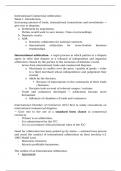Samenvatting
summary ALL READINGS International Commercial Arbitration (3754INQ6HY) (ICA)
Summary of ALL readings (Redfern&Hunter Chapters 1-11) of the course International Commercial Arbitration (ICA) (3754INQ6HY) in the Master Privaatrecht at the Universiteit of Amsterdam
[Meer zien]




